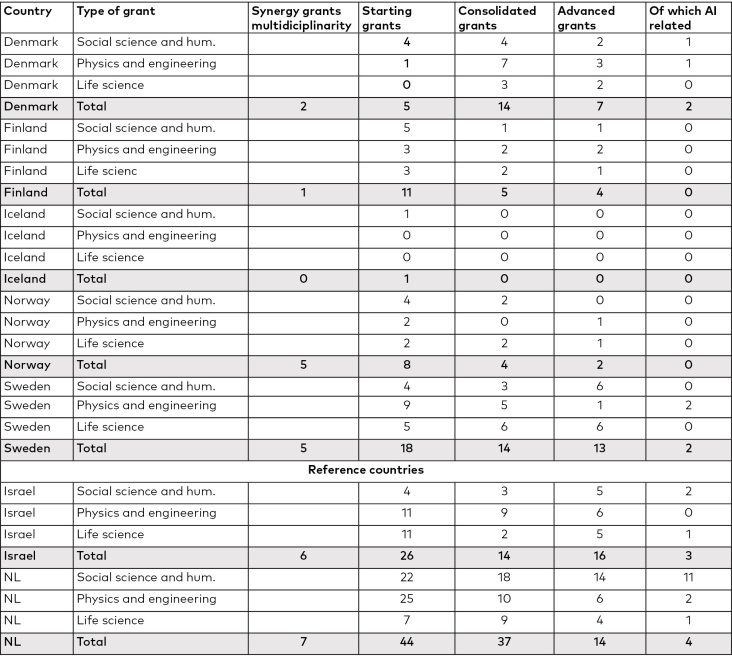Budgets for the 10 partnerships under Pillar II, Cluster 4, Digital, Industry and Space
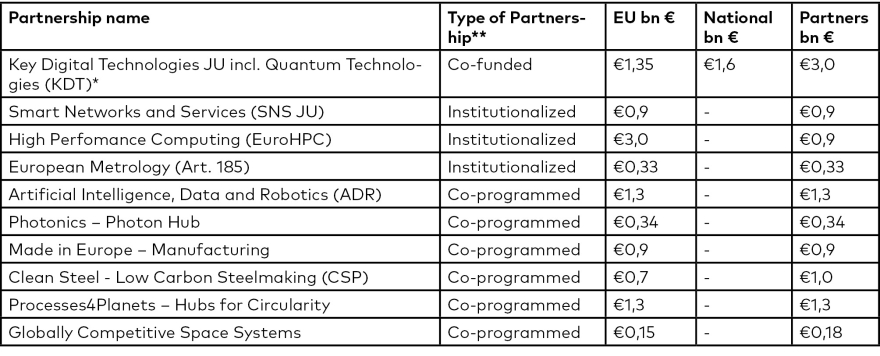
- KDT was in 2023 merged with the new Chips JU programme
- **Co-funded partnerships are funded by EU, National funding Agencies and private partners, Institutionalized partnerships on EU Council regulation Art. 187 or EU Parliament and Council Art. 185. They are implemented by dedicated structures without bi-annual work-programmes. Co-programmed are public-private partnerships co-funded by EU and the mostly private partners.
TEF - Sandbox transnational Testing and Experimentation Facilities for AI algorithms
In the first phase from 2021-2023, 4 TEF “sandboxes” under the Digital Europe have been approved. TEFs are sandbox test-centres where AI services can be tested in closed and safe environments before being released. The 4 TEFs started 1. January 2023. Other TEFs are expected to be in the coming years. According to the funding conditions TEFs must offer their services to SME’s, mid-caps, other organisations and researchers.
Total EU earmarked budget for TEFs: €220. EU funding per TEF €30-60 mio for a 5 years period.
There are Nordic participation in all 4 TEFs: DK in CITCoM.AI, AI-Matters, Finland in TEF-Health and Sweden in TEF-Health and Agri-Food.
TEFs will support AI developers to bring trustworthy AI to the market more efficiently, and facilitate its uptake in Europe. TEFs are specialised large-scale reference sites open to all technology providers across Europe to test and experiment at scale state-of-the art AI solutions, including both soft-and hardware products and services, e.g. robots, in real-world environments.
These large-scale reference testing and experimentation facilities will offer a combination of physical and virtual facilities, in which technology providers can get support to test their latest AI-based soft-/hardware technologies in real-world environments. This will include support for full integration, testing and experimentation of latest AI-based technologies to solve issues/improve solutions in a given application sector, including validation and demonstration.
TEFs can also contribute to the implementation of the Artificial Intelligence Act by supporting regulatory sandboxes in cooperation with competent national authorities for supervised testing and experimentation.
TEFs will be an important part of building the AI ecosystem of excellence and trust to support Europe’s strategic leadership in AI. The 4 TEFs focus on Agri-Food: agrifoodTEF, Healthcare: TEF-Health, Manufacturing: AI-MATTERS, Smart Cities & Communities: Citcom.AI.
List of TEFs approved by 2023
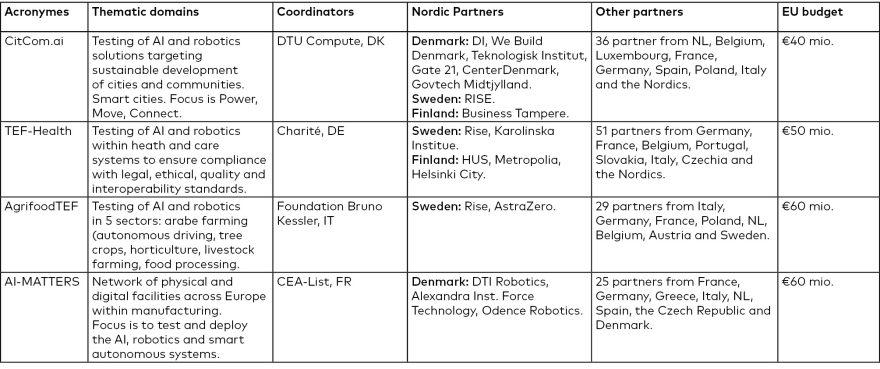
EDIH – National and regional European Digital Innovation Hubs or Competence Centres
EDIHs are national or regional competence centres with a focus on facilitating digital skills and knowledge. EDIH’s are offering their services to SME’s, mid-caps, other organizations and researchers. AI technology and knowledge is one of the key focus areas for most EDIHs. EDIH is co-funded by EU and national partners on a 50:50 basis. 161 EDIH has been accepted since 2021. 16 of the 26 Nordic EDIHs offer AI services. The Total EU funding budget €330, €1,5 to €3 per Hub.
List of Nordic EDIHs offering AI services
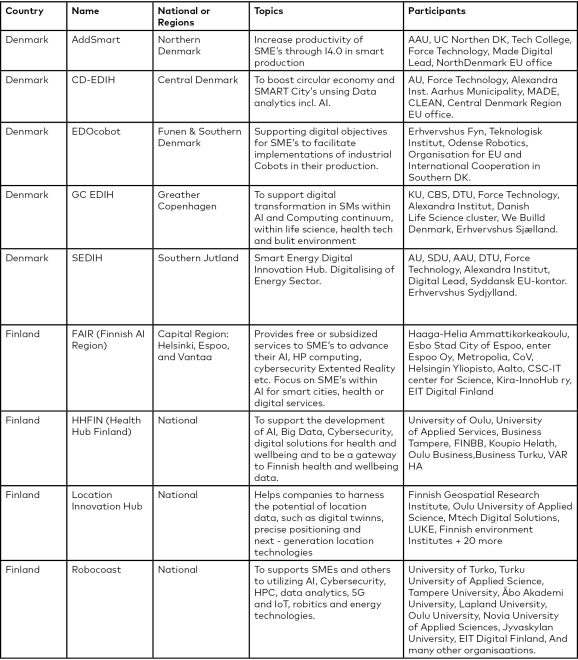
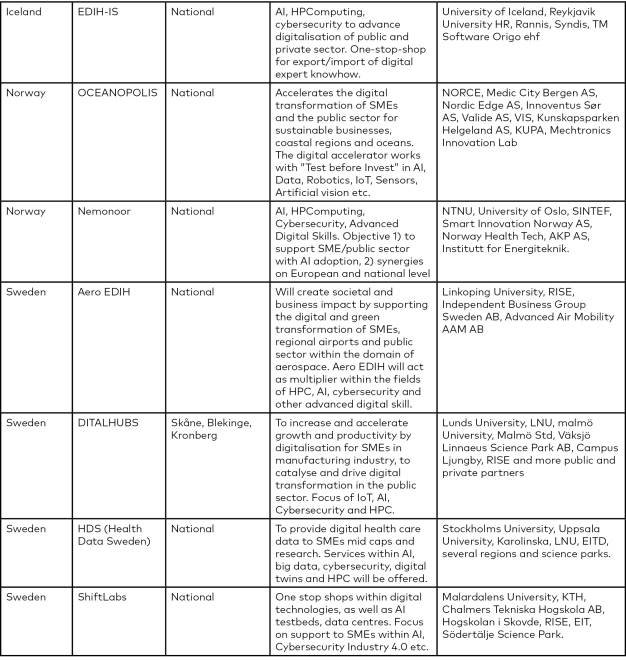
Other Digital Europe (2021-2027) initiatives – total EU budget €9,2 bn:
- Artificial Intelligence: €2,5 bn.
- High Performance Computing (HPC): €2,7 bn.
- Cyber Security: €2 bn.
- Digital transformation and interoperability: €1,3 bn.
- Advances Digital Skills: €0,7 bn.
Thematic programmes under Horizon Europe supporting AI R&I projects including
Chips Joint Undertaking – Approved in September 2023
The Chips JU is the main implementer of the Chips for Europe Initiative. The Chips JU aims at strengthening Europe's semiconductor ecosystem and economic security by managing an expected budget of nearly €11 billion by 2030, provided by the EU and participating states. In Chips JU budgets for infrastructure from DG Digital and budgets for Research and Innovation from DG Research have batched into one programme.
The Chips JU will:
- Set up pre-commercial, innovative pilot lines, providing industry state-of-the-art facilities to test, experiment and validate semiconductor technologies and system design concepts;
- Deploy a cloud-based Design Platform for design companies across the EU;
- Support the development of advanced technology and engineering capacities for quantum chips;
- Establish a network of competence centres and promote skills development.
- Fund earmarked budget for R&I projects within semi-conductors and microships.
- An open R&I budget for open R&I projects which will facilitate the introduction of new technology and concepts from the early design phase to the implementation in products.
- Open an EU funding mechanism for equity to SME’s and start-up.
The work of the Chips JU reinforces Europe's technological leadership by facilitating the transfer of knowledge from the lab to the fab, bridging the gap between research, innovation and industrial activities, and by promoting the commercialization of innovative technologies by European industry including start-ups and SMEs.
The R&I activities in the illustration above, which budget-wise is not covered under the Chips for Europe Initiatives budget is the Key Digital Technologies programme (KDT). KDT started as a Horizon Europe programme in 2021 but has now become a part of the new Chips JU programme. The two R&I programs in Chips JU are public-private partnerships between national authorities, industry, and the European Commission for research and innovation. The objective is to have a strong and globally competitive electronics components and systems industries in Europe. It aims to reinforce Europe’s potential to innovate through contribution of electronic components and systems, including microsystems, software technologies, sub-assemblies, and systems of systems giving secure and trusted technologies to strategic value chains.
AI technology is an integrated part of in most of the technologies addressed by the open R&I part of Chips JU. But to support an integrated use of AI, which today mostly runs in the cloud, new approaches such as edge computing, very small raspberry computers and embedded software and IoT solutions must be developed. This also include Edge AI Testing and Experimentation Facility to ensure the availability in Europe of trusted, high-performance, low-power edge components and technologies to support the massive data-processing requirements of AI and the digital transformation. The facility will enable companies to develop, test and experiment AI product prototypes based on advanced low-power computing technologies, custom-designed for their application environment.
European Research Council (ERC)
ERC has 4 bottom up programmes for researchers. The number of PhD degrees in topics that can be defined as artificial intelligence is also steadily growing. Moreover, methods from artificial intelligence are increasingly used as tools by PhD candidates and researchers in other areas. Open programmes as the ERC scholarships will hence increasingly be orined towards AI related studies. EU’s annual budget for ERS scholarships is approximately: €2,2 bio. The budget is shared by 4 EU programmes:
ERC Synergy grants (Grant for multiple Principal Investigators): Total budget for the programme: €400 mio. Max funding per grant €10 mio. for a period of 6 years. (+ extra €4 mio. if the applicants moves from a non-EU-country to EU 27 or associated country). The grant covers 100% of eligible costs + 25% in overhead.
Number of funded projects in 2022: 37 projects with a total budget of €395 mio. 135 researchers representing 114 universities and research centres in 19 countries received funding. Researchers in the Nordic countries received 13 grants. The projects are multi-disciplinary and includes researchers from several countries.
ERC Starting grant (Monobeneficiaries): For promising early-career researchers with 2 to 7 years experience after PhD. Funding up to €1,5 mio. For a period of up to 5 years. The grant covers 100% of eligible costs + 25% in overhead. Number of grants in 2023: 400 grants with at total budget of €628 mio. Succes-rate: 14,8%. Thematic distribution: 117 Society and Humanity, 173 Physics and Engineering, 110 Life Science. Succes rate: 14,8%. Researchers in the Nordic countries received 13 grants.
ERC Consolidator Grant (Monobeneficiaries): For excellent researchers with 7 to 12 years experience after PhD. Funding up to €2 mil. i 5 år. The grant covers 100% of eligible costs + 25% in overhead.
Number of grants in 2023: 308 grants with a total budget of €627 mio. Succes-rates 14,5%
Thematic distribution: Social Science & Humanities 90, Physical Science & Engineering 129, Life Science 89
ERC Advanced Grants (Monobeneficiaries): For established research leaders with a recognized track record of research achievements: Two cut off dates in 2023. Funding up to €2,5 mio. over 5 år. The grant covers 100% of eligible costs + 25% in overhead. Number of grants in 2023: Expected 246 grants with a total budget of €597 mio. Expected succes-rate 14%. The grants for the last 2023 call will be provided in Q1 2024.
Thematic distribution: Not known yet.
Distribution of Nordic ERC grants by programme and topic in 2023
